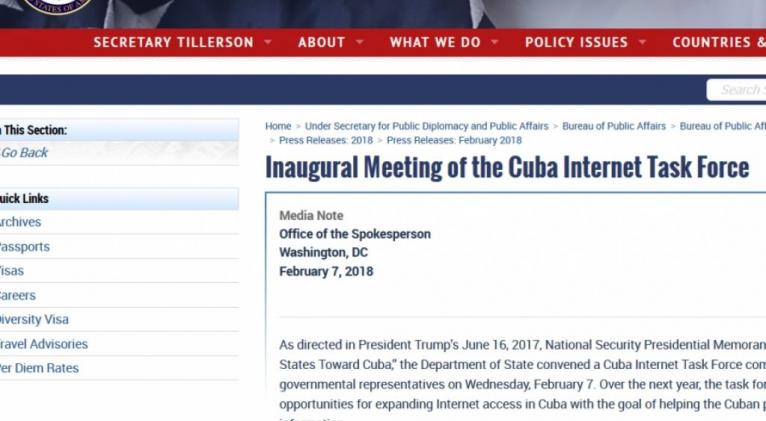Trump, the "Fake News" and the Cuba Internet Task Force

Just as it had been announced a week ago the Department of State summoned last Wednesday February 7th the first meeting of the Task Group dedicated to "increase" access to "information" and internet in Cuba.
As the official note reports at the website of the Department of State, the "Internet Team of Cuba made up by government and non-government representatives during next year will examine the technological challenges and opportunities to expand Internet access in Cuba with the objective of helping the Cuban people to enjoy the free and not regulated flow of information".
The new Cuba Internet Task Force is presided over by the Deputy Assistant Secretary of Statefor the Western Hemisphere, John S. Creamer, and besides the Department of State, for other entities like the Cuba Broadcasting Office, the Federal Commission for Communications, the National Administration of Telecommunications and Information of the Commerce Department, the U.S. Agency for International Development, Freedom House and the Information Technology Industry Council. All of them, as it’s known, with backgrounds in the history of subversive war of the United States against Cuba.
According to several sources, to the meeting held under fluorescent illumination at a conferences room in the basement of the Department of State, several representatives of the so-called Cuban opposing groups and local entities that promote the full restitution of diplomatic relationships attended.
As expected, AP reported, the "opposers", responding to the voice of their master, they used the public space to charge against the Cuban government, making comparisons with the Second World War and with governments from Syria and Iran.
However, and according to AFP, the representatives of the American civil society were not very impressed with the outlined objectives.
According to French agency, lawyer Tony Martínez questioned that? There isn’t in the Department of State any specific group on internet on any other country. Why? Do they believe this is the way to attain the expected changes??
The same source highlighted that activist Cheryl LaBash pointed out that in Detroit, her city in 2015 the 40% of the population didn’t have access to internet. I think that the best way of improving access to internet in Cuba would be to negotiate with the Cuban government in a respectful way. Have any of you been in Cuba? LaBash’s question to the members of the group only receive silence for an answer.
The always present topic of the so-called "independent" media on its defense some argued that any North American plan would backfire because it would undermine the independence and credibility that it’s perceived in the flourishing "independent" media in Cuba.
On the other hand, the leader of the group, Undersecretary of State John Creamer who must deliver a final report by late October with recommendations to the Secretary of State and the President, remarked that the Cuban government leaks and blocks websites in an attempt to prevent Cubans from having the opportunity to criticize Cuban institutions and politicians. These sort of aggressive acts have a chilling effect in the exercise of freedom of speech.
Speaking of freedom of speech, the new task force created by the U.S. government for the media subversion against Cuba, it should concentrate its efforts and resources to take care of the problems that in this regard the United States face at present.
As the UN High Commissioner for Human Rights, Zeid Ra'ad Al Hussein alerted in Geneva: "the freedom of press and the integrity of journalists are at stake in the United States under the Administration of President Donald Trump.
"Trump is undermining the freedom of press, while dangerous events already in motion could lead to an increase of violence against journalists", said Zeid in that opportunity.
The official spoke of Trump’s constant accusations that the media produce fake news, the famous term coined by the leader to refer to lies or false news, and his repeated verbal attacks against the newspapers The New York Times, The Washington Post or the television CNN.
On top of that, in January this year, the International Press Institute (IPI) announced that it will carry an international mission to the United States to evaluate the changes in the media and the freedom of press panorama and expose its concerns to the related authorities.
IPI, like the entire world, doesn't see with very good eyes those repeated attacks against journalists and media during Trump’s presidential campaign that included verbal harassment and denial of press credentials.
For anyone with some brains is highly counteractive and paradoxical that the first censor of the United States evaluates in October the "freedom of speech" in Cuba. There isn’t greater machinery of "fake news" than the one usually used by the sort of task force groups like the recently created against Cuba against those countries that don't bend before the imperial hegemony, like the cases of Venezuela, Iran or Syria.
It will certainly be unethical to criticize the fake news at home while they create media machineries to export to other nations.
Amilkal Labañino Valdés / Cubasí Translation Staff













Add new comment